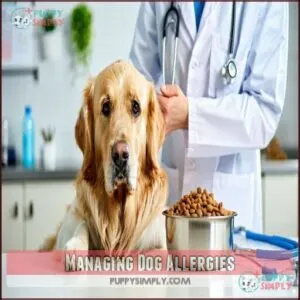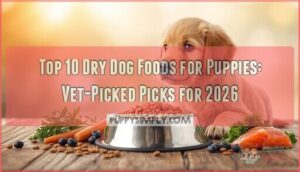This site is supported by our readers. We may earn a commission, at no cost to you, if you purchase through links.
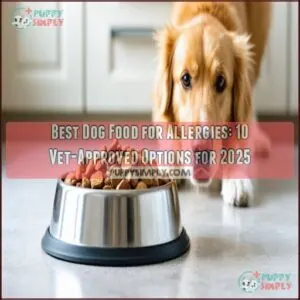
Look for options labeled hypoallergenic or containing hydrolyzed proteins, which are broken down to minimize allergic reactions.
High-quality brands such as Hill’s Science Diet Sensitive Stomach, Natural Balance L.I.D., and Purina Pro Plan Sensitive Skin & Stomach offer formulas specifically designed for allergic pups.
Avoid common allergens including chicken, beef, dairy, wheat, and soy.
Remember that what works for one four-legged friend might not work for another – the best dog food for allergies often requires some detective work and patience.
Table Of Contents
- Key Takeaways
- Dog Allergy Symptoms
- Choosing Best Dog Food
- Top 10 Dog Foods for Allergies
- 1. Natural Balance Sweet Potato Venison Dry Dog Food
- 2. Grain Free Venison Dog Food
- 3. Diamond Care Sensitive Skin Dog Food
- 4. Open Farm Plant Based Vegan Dog Food
- 5. Sustainable Turkey and Chicken Dog Food
- 6. Grain Free Dog Food Turkey
- 7. Hills Prescription Dog Food Sensitivities
- 8. Purina Hydrolyzed Protein Dog Food
- 9. ORIJEN Regional Red Grain Free Dry Dog Food
- 10. Blue Buffalo NP Alligator Dry Dog Food
- Managing Dog Allergies
- Preventing Allergic Reactions
- Frequently Asked Questions (FAQs)
- Which dog food is best for dogs with allergies?
- How to choose the right dog food for allergies?
- Is wellness simple a good diet for dogs with allergies?
- Can plant-based dog food help with allergies?
- What’s the best food to give a dog with allergies?
- What food is best for dogs with itchy skin?
- Which dry dog food is best for allergies?
- What is the number 1 food allergy in dogs?
- Food Allergyor Food Intolerance?
- What food is best for a dog with allergies?
- Conclusion
Key Takeaways
- You’ll want to choose limited ingredient dog foods with novel proteins like venison, duck, or salmon for allergic dogs, while avoiding common allergens such as chicken, beef, wheat, and soy.
- Watch for allergy symptoms in your dog including itchy skin, redness, recurring ear infections, hair loss, and digestive issues like vomiting and diarrhea.
- Consider specialized options such as hydrolyzed protein formulas (like Hill’s Prescription Diet or Purina Pro Plan), grain-free diets, or even plant-based foods for severe protein allergies.
- Always transition to new foods gradually over 7-10 days, monitor health improvements, and work with your veterinarian to identify specific allergens and create a personalized diet plan.
Dog Allergy Symptoms
You’ll notice your dog’s food allergies through symptoms like itchy skin, recurring ear infections, or digestive issues including vomiting and diarrhea.
Environmental allergens such as pollen or dust can cause similar reactions, so it’s essential to consult your veterinarian for an accurate diagnosis before selecting a specialized diet.
Itchy Skin and Redness
Frequently, itchy skin and redness are the first visible signs of dog food allergies you’ll notice.
These uncomfortable symptoms can substantially impact your pet’s quality of life.
Four common signs of skin inflammation include:
- Excessive scratching, particularly around ears, paws, and belly
- Reddened, irritated skin especially in skin folds
- Hot spots or localized areas of intense irritation
- Recurring secondary infections due to compromised skin barriers
Certain breeds show predisposition to these reactions, with environmental triggers and flea allergies often exacerbating the condition.
Notably, vomiting can also occur, which can be a significant indicator of a more serious issue, affecting the overall quality of life.
Digestive Issues and Vomiting
Your dog’s digestive distress could signal food allergies. When your furry friend develops gastrointestinal issues like vomiting, diarrhea, or excessive gas, it’s often their body rejecting certain ingredients.
Food intolerances typically manifest through digestive upset, while true allergies may cause both skin and gut reactions.
Consider sensitive stomach dog food with probiotic support and dietary fiber. An elimination diet helps identify triggers, while proper hydration and enzyme supplementation aid recovery during flare-ups.
Chronic Ear Infections and Hair Loss
Beyond digestive problems, chronic ear infections and hair loss often signal food allergies in your furry friend.
You’ll notice your dog constantly scratching their ears or shaking their head, with visible inflammation inside the ear canal.
Hair loss patterns typically appear around the face, paws, and belly, where itchy skin prompts excessive licking and scratching.
Certain breeds show predisposition to these symptoms, particularly those with floppy ears or skin folds.
Choosing Best Dog Food
You’ll need to select a dog food that specifically addresses your pet’s allergens by focusing on limited ingredients, novel proteins, or grain-free formulations as recommended by veterinarians.
Consulting with your vet before making dietary changes will help identify the most effective approach for your dog’s specific allergic symptoms and guarantee proper nutritional balance.
Limited Ingredient Diets
Now that you understand the symptoms of dog food allergies, limited ingredient diets (LIDs) offer a straightforward solution.
These specialized formulas contain fewer components, making it easier to identify and avoid allergens.
With careful ingredient sourcing and recipe variety, LIDs minimize exposure to potential triggers while maintaining nutritional balance.
These diets often utilize novel protein sources to further reduce allergic reactions.
Though they may require cost analysis for long-term use, their diet effectiveness in resolving symptoms often makes them worth the investment for hypoallergenic dog food needs.
Novel Protein Sources
Through introducing novel protein sources, you can substantially reduce your dog’s allergic reactions.
When traditional proteins like beef and chicken trigger symptoms, exotic proteins like kangaroo, rabbit, and venison offer novel benefits for sensitive pups.
These uncommon protein sources aren’t typically recognized as allergens by your dog’s immune system.
Consider protein rotation to prevent developing new sensitivities.
Sourcing matters too—look for high-quality novel protein dog food with excellent digestibility factors to maximize nutrient absorption.
Many owners find venison-based dog food to be a great option.
Grain-Free and Gluten-Free Options
While novel proteins address meat allergies, some dogs actually struggle with grain allergies.
Grain-free dog food eliminates wheat, corn, rice, and barley—common culprits behind digestive issues and skin reactions.
Though true gluten sensitivity is rare (mainly in Irish Setters and certain Border Terriers), these diets offer alternative starches that can improve digestibility concerns.
Many pet parents report seeing better coat health and increased energy after switching to grain-free options. You can find various brands available online.
Top 10 Dog Foods for Allergies
You’ll find these vet-approved foods specifically formulated to address canine allergies, with specialized ingredients that minimize adverse reactions.
These carefully selected options feature novel proteins, limited ingredients, and therapeutic formulations designed to reduce inflammation and alleviate symptoms in dogs with food sensitivities.
1. Natural Balance Sweet Potato Venison Dry Dog Food

Natural Balance Sweet Potato Venison Dry Dog Food offers allergy-prone pups a single animal protein source combined with gluten-free sweet potatoes.
This limited ingredient diet contains 20% crude protein and 10% crude fat, providing balanced nutrition while minimizing allergen exposure.
Enriched with menhaden fish oil and flaxseed, it supports skin health and reduces inflammation – critical benefits for itchy dogs.
With a 3.5-star average rating, many pet parents report improved symptoms and digestion.
However, some recent batches have been criticized for texture issues. Though slightly pricey, this veterinarian-recommended option may be worth trying for your sensitive companion.
Best For: Dogs with allergies or sensitive stomachs requiring a limited ingredient diet with a single animal protein source.
- Limited ingredient diet ideal for reducing allergens.
- Supports skin health with fish oil and flaxseed.
- Improves digestion and reduces inflammation in many dogs.
- Recent batches reported as dry and crumbly.
- Price may be a concern for some buyers.
- Kibble may be too hard for some dogs.
2. Grain Free Venison Dog Food
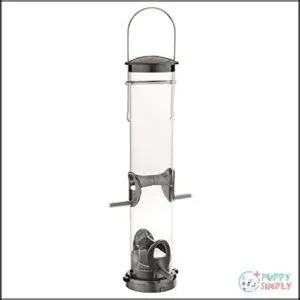
Grain free venison dog food offers an ideal solution for dogs with allergies to common proteins.
This specialized formula uses venison as a novel protein source, making it perfect for pups with poultry sensitivities.
The nutrient-rich recipe contains high-quality animal protein (20-28%) alongside omega fatty acids for skin health.
Free from common allergens like corn, wheat, and soy, it instead incorporates digestible alternatives such as sweet potatoes and chickpeas.
The ethically sourced, grass-fed venison from New Zealand meets AAFCO standards for all life stages, supporting your dog’s overall health while avoiding potential triggers.
This formula is designed to provide a novel protein source, making it an excellent choice for dogs with specific dietary needs.
Best For: Dogs with food allergies or sensitivities to common proteins like poultry.
- Contains novel protein from grass-fed New Zealand venison.
- Grain-free formula with digestible ingredients like sweet potatoes and chickpeas.
- High in omega fatty acids and meets AAFCO nutritional standards.
- Limited protein variety may not suit all dogs’ preferences.
- Venison-based recipes can be relatively expensive.
- May not be widely available in all regions.
3. Diamond Care Sensitive Skin Dog Food

Diamond Care’s skin-saving formula offers a specialized solution for dogs with dermatological sensitivities.
Perfect for pups with sensitive skin, this formula soothes irritation while promoting a shiny coat and healthy digestion.
With hydrolyzed salmon as its single animal protein source, this limited-ingredient diet eliminates common allergens while remaining grain-free and potato-free.
The carefully balanced ratio of omega-6 and omega-3 fatty acids promotes healthier skin and a shinier coat.
You’ll appreciate that it’s formulated for everyday, long-term feeding while still addressing allergic reactions.
The guaranteed probiotics support both digestion and immune system function, providing thorough care beyond just addressing skin issues.
It’s a complete nutritional package for your sensitive canine companion.
Best For: Dogs with sensitive skin or dietary issues requiring a grain-free, limited-ingredient diet.
- Hydrolyzed salmon helps avoid common allergens.
- Omega fatty acids improve skin and coat health.
- Guaranteed probiotics support digestion and immunity.
- Limited flavor options may not appeal to picky eaters.
- Premium price point compared to standard dog food.
- Grain-free diets may not suit all dogs.
4. Open Farm Plant Based Vegan Dog Food

For dogs with severe protein allergies, Open Farm Plant Based Vegan Dog Food offers a revolutionary solution.
This completely hypoallergenic formula eliminates all animal proteins while still delivering balanced nutrition.
The plant-based ingredients provide anti-inflammatory benefits that can help reduce itchy skin and digestive issues.
You’ll find high-quality protein sources that support muscle health alongside omega 3 and 6 fatty acids for coat and skin improvement.
Many veterinarians recommend this option for dogs with multiple protein sensitivities when traditional limited-ingredient diets haven’t resolved allergy symptoms.
Its dairy-free formulation makes it particularly suitable for dogs with lactose intolerance, offering a solution with balanced nutrition and hypoallergenic properties.
Best For: Dogs with severe protein allergies and lactose intolerance needing a hypoallergenic, plant-based, nutritionally balanced diet.
- Hypoallergenic formula eliminates animal proteins, reducing allergy symptoms.
- Supports muscle health with high-quality plant-based protein.
- Omega 3 and 6 fatty acids improve coat and skin health.
- May not appeal to picky eaters unfamiliar with plant-based diets.
- Transition period may cause temporary digestive issues.
- Limited availability in some local pet stores.
5. Sustainable Turkey and Chicken Dog Food

Looking for sustainability in your allergy-friendly dog food choices? Open Farm’s Turkey & Chicken Recipe meets AAFCO standards for all life stages except large-breed puppies.
This family-run Canadian business sources high-quality ingredients from farmers who prioritize animal welfare. Their grain-free formulation includes fresh turkey and chicken from partner family farms, complemented by ocean-caught fish and local produce.
With omega fatty acids and prebiotic fibers, it’s ideal for sensitive digestion. Similarly, Health Extension and Go! Solutions offer limited-ingredient turkey options that minimize common allergens while maintaining complete nutrition profiles, perfect for dogs with food sensitivities.
Best For: Dog owners seeking allergy-friendly, sustainable, and nutrient-rich food options for pets with sensitive digestion or specific dietary needs.
- Contains high-quality turkey and chicken from animal welfare-certified farms.
- Grain-free with omega fatty acids and prebiotic fibers for digestion support.
- Sourced from trusted partners prioritizing sustainability and ethics.
- Not suitable for large-breed puppies due to AAFCO limitations.
- Premium ingredients may result in higher cost.
- Limited options for dogs needing chicken-free diets.
6. Grain Free Dog Food Turkey
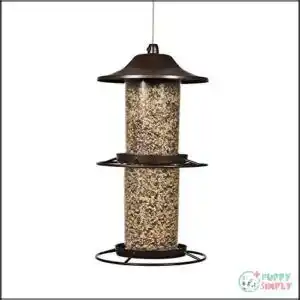
Turkey-based grain-free formulas offer an excellent solution for dogs with grain sensitivities.
These specialized diets feature high-quality deboned turkey as the primary protein source, which is both lean and rich in essential vitamins and minerals.
The absence of common allergens like corn, wheat, and soy minimizes the risk of adverse reactions.
Complemented with easily digestible carbohydrates such as sweet potato and pumpkin, these foods provide complete nutrition without triggering allergies.
The balanced omega fatty acids from flaxseed and sunflower oil help promote healthy skin and coat, while active probiotics support digestive health.
Your dog can enjoy flavorful meals without the discomfort of allergic responses.
Best For: Dogs with grain sensitivities or food allergies needing a lean, novel protein source.
- High-quality deboned turkey as a lean, nutrient-rich protein source.
- Grain-free and easily digestible carbohydrates like sweet potato and pumpkin.
- Omega fatty acids and probiotics promote skin, coat, and digestive health.
- Limited to dogs needing grain-free diets or with specific allergies.
- May not be suitable for dogs with protein sensitivities to turkey.
- Typically more expensive than standard dog foods.
7. Hills Prescription Dog Food Sensitivities
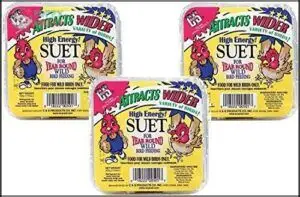
Hill’s Prescription Diet for sensitivities stands out as a veterinarian-developed solution backed by clinical research.
This specialized formula contains hydrolyzed protein that breaks down into tiny pieces, making it virtually unrecognizable to your dog’s immune system.
The single intact protein source combined with high-quality ingredients like potato and fish oil works to support both skin and digestive health.
You’ll need a prescription from your veterinarian to purchase this food, as it’s specifically formulated for managing food sensitivities.
Many pet parents report significant improvements in their dogs’ skin irritation, ear conditions, and digestive function after switching to this diet.
Best For: Dogs with food-related allergies or sensitivities needing a diet tailored to improve skin and digestive health.
- Clinically proven to improve digestion and alleviate irritation.
- Developed by veterinarians for tailored dietary management.
- High-quality ingredients like hydrolyzed protein and fish oil.
- Requires prescription, limiting immediate availability.
- Higher cost compared to non-prescription options.
- May not suit dogs without specific sensitivities.
8. Purina Hydrolyzed Protein Dog Food
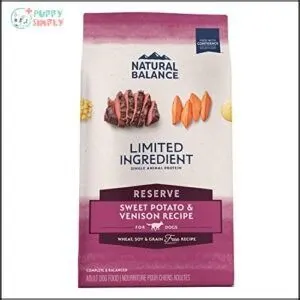
Veterinarians often recommend Purina Pro Plan Veterinary Diets HA Hydrolyzed Protein Dog Food as a solution for dogs with severe allergies.
This specialized formula contains protein that’s been broken down into smaller components, making it less likely to trigger adverse reactions.
With a rating of 4.6/5 stars on Chewy, it’s formulated to meet AAFCO nutritional standards for adult dogs.
The single carbohydrate source paired with hydrolyzed protein creates a truly hypoallergenic option.
Available in chicken flavor, this prescription diet costs around $129.99 and provides complete nutrition while minimizing allergic responses.
Best For: Dogs with severe allergies or sensitivities needing a hypoallergenic diet.
- Formulated with hydrolyzed protein to reduce allergic reactions.
- Meets AAFCO standards for adult dogs’ nutritional needs.
- Single carbohydrate source for easy digestion.
- Requires a veterinary prescription to purchase.
- Higher cost at $129.99 per bag.
- Limited flavor options, only available in chicken.
9. ORIJEN Regional Red Grain Free Dry Dog Food
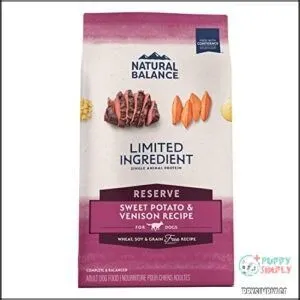
While many dogs struggle with common protein allergies, ORIJEN Regional Red Grain Free Dry Dog Food offers a robust alternative with its diverse protein profile.
This formula contains an impressive 85% quality animal ingredients including fresh ranch-raised beef, wild boar, Boer goat, grass-fed lamb, and wild-caught mackerel. The WholePrey approach incorporates nourishing organs and bone, delivering natural nutrition.
Rich in Omega-3 and Omega-6 fatty acids, it supports healthy skin and coat health—crucial for allergy-prone pups. It’s also worth noting that some grain-free options offer allergy relief potential.
The formula meets AAFCO nutritional standards for all life stages except large-breed puppies, making it a versatile option for your furry friend, with a focus on quality animal ingredients and healthy skin.
Best For: Dogs of all life stages, excluding large-breed puppies, needing a grain-free diet with diverse, high-quality animal protein sources.
- Contains 85% quality animal ingredients, including fresh or raw protein sources.
- Rich in Omega-3 and Omega-6 fatty acids, promoting healthy skin and coat.
- Meets AAFCO standards for most life stages with a WholePrey approach.
- Not suitable for large-breed puppies due to AAFCO restrictions.
- More expensive compared to many other dog food options.
- Grain-free formulation may not suit all dogs depending on their dietary needs.
10. Blue Buffalo NP Alligator Dry Dog Food
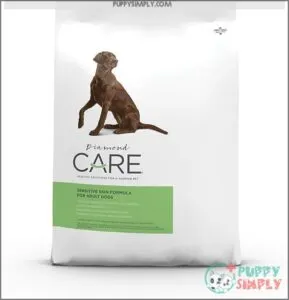
The Blue Buffalo NP Alligator Dry Dog Food offers a unique solution for dogs with severe food sensitivities.
It features alligator as a single novel protein source, unlikely to trigger allergic reactions.
You’ll appreciate its limited ingredient formula that excludes common allergens like corn, wheat, and soy.
The food is enriched with omega-3 fatty acids to support healthy skin and reduce inflammation.
One pet owner successfully switched their Chihuahua terrier from prescription food, reporting resolved ear infections and improved digestion after five weeks.
It’s both cost-effective and palatable—dogs actually enjoy the taste while their symptoms improve.
Best For: Dogs with severe food sensitivities, skin allergies, or digestive issues requiring a novel protein and limited ingredient diet.
- Alligator as a unique, novel protein helps minimize allergic reactions.
- Omega-3 fatty acids support healthy skin and inflammation reduction.
- Free from corn, wheat, soy, and artificial additives.
- May not be readily available in all local pet stores.
- Higher price point compared to standard dog foods.
- Limited variety in flavors for picky eaters.
Managing Dog Allergies
Successfully managing your dog’s allergies requires consistent monitoring and appropriate dietary adjustments based on veterinary guidance.
You’ll need to switch foods gradually while watching for symptom improvement, as rushing changes can exacerbate allergic reactions rather than resolve them, which is why veterinary guidance is crucial.
Gradual Food Transition Strategies
Now that you’ve selected an allergy-friendly dog food, you’ll need a smart conversion timeline.
Start by mixing 25% new food with 75% old food for 2-3 days. Gradually increase the ratio until you’re at 100% new food by day 10.
During dietary adjustments, watch for symptom monitoring—improved skin, better digestion, or reduced scratching.
Add probiotic support to ease digestive stress. For palatability concerns, try warming the food slightly or adding a splash of bone broth.
Importance of Veterinary Guidance
In the context of managing dog allergies, veterinary guidance isn’t just helpful—it’s essential.
A professional can determine the exact triggers causing your pet’s discomfort through proper allergy testing and breed predisposition knowledge.
- Your veterinarian creates a personalized diet plan customized to your dog’s specific needs
- They can interpret subtle symptom changes that you might miss
- Their expertise prevents costly trial-and-error approaches that could prolong your pet’s suffering
Monitoring Health Improvements
Veterinary guidance sets the stage for your dog’s recovery, but the real proof comes from careful monitoring.
Track symptom alleviation after starting a dog food elimination diet by keeping a daily journal of your pup’s energy levels, coat condition, stool quality, and weight changes.
Most allergy symptoms begin improving within 4-8 weeks, look for reduced scratching, clearer skin, and better digestion—these silent victories signal you’re on the right track toward solving your furry detective’s case.
Avoiding Hidden Allergens in Dog Foods
While monitoring improvements, don’t overlook hidden culprits. Label reading becomes your detective work—terms like "animal fat" and "poultry by-products" often mask common dog food allergens like chicken.
Cross-contamination risks exist when manufacturers use shared equipment for processing methods. Even hypoallergenic dog food may contain traces of allergens through ingredient sourcing.
Be aware of other sources of allergens around your home. Watch for artificial additives that can trigger allergy symptoms when your pup seems mysteriously itchy.
Preventing Allergic Reactions
You can substantially reduce your dog’s allergic reactions by identifying trigger ingredients and implementing a systematic approach to food selection.
Consistent monitoring of your pet’s response to new foods, coupled with regular veterinary consultations, will establish an effective prevention strategy that addresses both immediate symptoms and long-term management.
Alternate Proteins
Now that you’ve established a plan for managing your dog’s allergies, exploring alternate proteins can be a game-changer for preventing future reactions.
Novel protein sources like venison, rabbit, and duck provide excellent alternatives for dogs sensitive to common proteins.
- Insect protein offers a sustainable option with complete amino acid profiles for dogs with multiple meat sensitivities
- Plant-based diets utilizing pea or potato protein can reduce allergic responses while maintaining nutrition
- Hydrolyzed protein dog food breaks proteins into smaller molecules, making them less likely to trigger allergic reactions
These hypoallergenic dog food options give your allergic pup the nutrition they need without the uncomfortable food allergy symptoms that traditional proteins might cause, providing a way to manage allergies with complete amino acid profiles.
Signs of an Allergic Reaction
Vigilant pet parents should watch for these key allergic reaction signs in their dogs.
Skin inflammation, excessive licking, and persistent scratching often indicate food allergies.
You’ll also notice fur loss around the face or paws, recurring ear infections, and gastrointestinal distress like vomiting or diarrhea.
Itchy skin that doesn’t respond to regular treatments suggests an underlying allergy problem rather than just dry skin.
Identifying these triggers may require a dog allergy test.
Vet Consultation
While watching for allergic reactions in your dog, scheduling regular vet consultations remains your best defense.
Regular vet visits are your dog’s best ally in uncovering hidden allergies and crafting a personalized care plan.
A veterinarian’s expertise in allergy testing can determine if your pup has breed predispositions to certain allergens.
They’ll guide you through a proper diet trial and create personalized advice for symptom management, think of your vet as your dog’s food detective—they’ll solve the mystery that over-the-counter solutions often can’t crack, providing personalized advice and helping with symptom management.
Grain-Free Diets for Allergies
While your vet provides personalized advice, let’s explore grain-free diets as an allergy management option.
Grain-free dog food can benefit certain dogs with specific sensitivities, but it’s not a cure-all.
When choosing these formulations, check for nutritional completeness and suitable starch alternatives like sweet potatoes or lentils.
Remember that breed specifics matter too—some dogs thrive on grain-free diets while others may experience long-term effects that require monitoring.
Frequently Asked Questions (FAQs)
Which dog food is best for dogs with allergies?
You’ll find Royal Canin Ultamino, Hill’s Prescription Diet z/d, and The Farmer’s Dog work best for allergic dogs.
Consider limited-ingredient formulas with novel proteins and consult your vet before switching to these hypoallergenic options.
How to choose the right dog food for allergies?
You’d think finding the right food would be simple, but it’s not.
Consult your vet, identify specific allergens through elimination trials, and select limited-ingredient or hydrolyzed protein diets matching your dog’s needs.
Is wellness simple a good diet for dogs with allergies?
Wellness Simple can be a good option for your allergic dog as it features limited ingredients, novel proteins, and lacks common allergens.
You’ll need to match the specific formula with your dog’s particular sensitivity.
Can plant-based dog food help with allergies?
Plant-based dog food can help with allergies, as dogs can obtain essential amino acids from plants.
It’s especially beneficial if your pup has reactions to common animal proteins like beef or chicken.
What’s the best food to give a dog with allergies?
Just like humans, your dog’s allergies need personalized attention.
Consult your vet for diagnosis, then try limited-ingredient diets with novel proteins, hydrolyzed formulas, or prescription options like Hill’s z/d or Royal Canin Ultamino.
What food is best for dogs with itchy skin?
For dogs with itchy skin, consider foods with omega-3 fatty acids, limited ingredients, and novel proteins.
Royal Canin, Hill’s Prescription Diet, and The Farmer’s Dog offer excellent options that can reduce inflammation and allergic reactions, making them a good choice for dogs with itchy skin due to their ability to reduce inflammation.
Which dry dog food is best for allergies?
For dogs with allergies, Hill’s Prescription Diet z/d, Royal Canin Veterinary Diet, and Purina Pro Plan Sensitive Skin formulas are excellent options.
You’ll want to consult your veterinarian before switching to these specialized foods.
What is the number 1 food allergy in dogs?
The king of canine food sensitivities is beef.
Your dog’s itchy skin, ear infections, or digestive troubles could be triggered by this common protein source, which tops the list of food allergens in dogs.
Food Allergyor Food Intolerance?
Food allergies trigger immune responses with symptoms like itching and hives, while intolerances don’t involve your dog’s immune system but cause digestive issues like gas and diarrhea.
They require different management approaches.
What food is best for a dog with allergies?
Consult your veterinarian for personalized recommendations.
Hydrolyzed protein formulas like Hill’s Prescription Diet z/d or limited ingredient diets with novel proteins often work best for allergic dogs.
Consider Royal Canin or The Farmer’s Dog.
Conclusion
Finding the best dog food for allergies might seem overwhelming, but it’s worth the effort to see your furry friend comfortable again.
Remember that patience is key during this process—results aren’t always immediate.
With vet guidance, careful ingredient monitoring, and these top 10 options, you’ll be well-equipped to tackle your pup’s food sensitivities.
Your dog’s wagging tail and itch-free days will be the ultimate reward for choosing the right best dog food for allergies.
- https://www.lsu.edu/vetmed/faculty/pucheu.php
- https://www.rcvs.org.uk/who-we-are/rcvs-council/council-members/elected+members/susan-paterson/
- https://www.virtualvetderms.com/
- https://www.fda.gov/animal-veterinary/outbreaks-and-advisories/fda-investigation-potential-link-between-certain-diets-and-canine-dilated-cardiomyopathy







